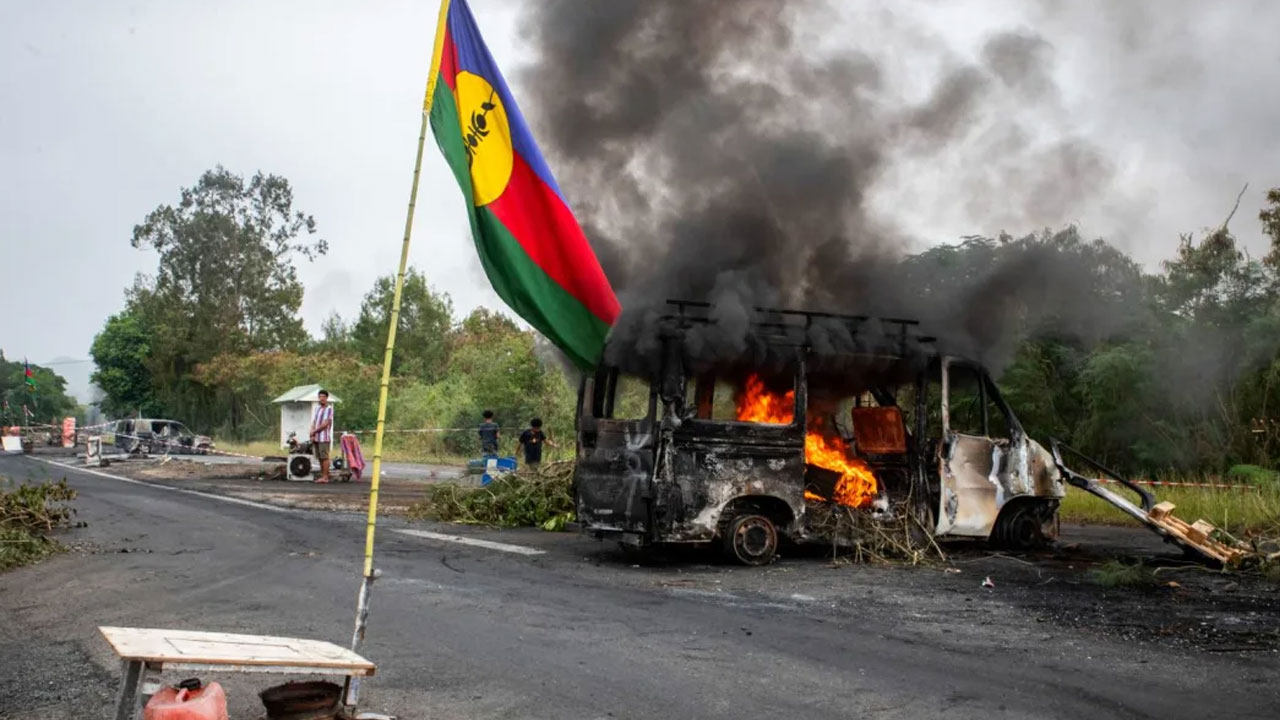Fiji and Papua New Guinea have urged the UN’s decolonisation committee to expedite a visit to the French-controlled Pacific territory of New Caledonia following its pro-independence riots last month.
Nine people have died, dozens were injured and businesses were torched during unrest in the capital Noumea triggered by the French government’s move to dilute the voting power of New Caledonia’s indigenous Kanak people.
Fiji’s permanent representative to the UN Filipo Tarakinikini, whose statement was also on behalf of Papua New Guinea, spoke of the two countries’ “serious concern” at the disproportionate number of Kanaks who have lost their lives since the onset of the crisis.
“We underscore that New Caledonia can best be described as a fork in the road situation,” Tarakinikini told the committee session at UN headquarters in New York.
“History is replete with good lessons,” he said, “to navigate such situations toward peaceful resolution. Today we have heard yet again loud and clear what colonisation does to a people.”
Tarakinikini said Fiji and Papua New Guinea want the UN’s Special Committee on Decolonisation to send a visiting mission to New Caledonia as soon as possible to get first-hand knowledge of the situation.
He also criticised militarisation of the island after France sent hundreds of police and troops with armored personnel carriers to restore order. Unrest has continued despite the security reinforcements.
“Taking up arms against each other is not the solution, nor is the militarisation and fortification by authorities in the territory the correct signal in our Blue Pacific continent,” Tarakinikini said.
New Caledonia’s international airport remains closed, preventing pro-independence President Louis Mapou and other representatives from traveling to the UN committee.
Rioting is estimated by the local chamber of commerce to have caused US$200 million in economic damage, with 7,000 jobs lost.
The decolonisation committee was established by the UN General Assembly in 1961 to monitor implementation of the international commitment to granting independence to colonised peoples. Today, some 17 territories, home to two million people and mostly part of the former British empire, are under its purview.
Fiji and Papua New Guinea are both long-term committee members, which has listed New Caledonia as a UN non-self-governing territory under French administration since 1986.
In the Pacific, American Samoa, French Polynesia, Guam, Pitcairn and Tokelau also remain on the list.
Representatives of civil society organisations who spoke to the committee criticised France’s control of New Caledonia and blamed it for triggering the crisis.
Loyalists who made submissions likened the riots to a coup and a deliberate sabotage of what they said was the previous consensus between Kanaks and French immigrants, “forcing those who do not adhere to the independence project to leave.”
France’s statement to the meeting appeared to blame outside forces for fomenting unrest. “Certain external actors, far from the region, seek to fuel tensions through campaigns to manipulate information,” the country’s delegate said, adding the European country would “continue its cooperation with the UN., including during this key period.”
French National Assembly member from French Guiana Jean Victor Castor warned the country had entered a “new phase of colonial repression.”
Castor also called on the UN to send a mission to “encourage France to respect its commitments and pursue the path of concerted decolonisation, the only guarantee of a return to peace.”
France’s control of New Caledonia gives the European nation a significant security and diplomatic role in the Pacific at a time when the U.S, Australia and other Western countries are pushing back against China’s inroads in the region. New Caledonia, home to about 270,000 people, also has valuable nickel deposits that are among the world’s largest.
The unrest was the worst political violence in the Pacific territory located between Australia and Fiji since the 1980s. The riots erupted May 12 as the lower house of France’s parliament debated and subsequently approved a constitutional amendment to unfreeze New Caledonia’s electoral roll, which would give the vote to thousands of French immigrants.
Final approval of the amendment requires a joint sitting of France’s lower house and Senate. But the future of a vote is now unclear after French President Emmanuel Macron earlier this week called a snap general election in France.
Referendums held in 2018 and 2020 under the UN mandated decolonisation process produced modest majorities in favour of remaining part of France.
Less than half of New Caledonians voted in the third and final referendum in 2021 that overwhelmingly backed staying part of France.
The vote was boycotted by the Kanak independence movement after it was brought forward without consultation by the French government during a serious phase of the COVID-19 pandemic, which restricted campaigning.
Mareva Lechat-Kitalong, Delegate for International, European and Pacific Affairs of French Polynesia, told the committee what happened with New Caledonia’s third referendum should “not happen again for a question so fundamental as independence or not.”
She also urged France to commit to a roadmap for French Polynesia that “fully supports a proper decolonisation process and self-determination process under the scrutiny of the United Nations.”














